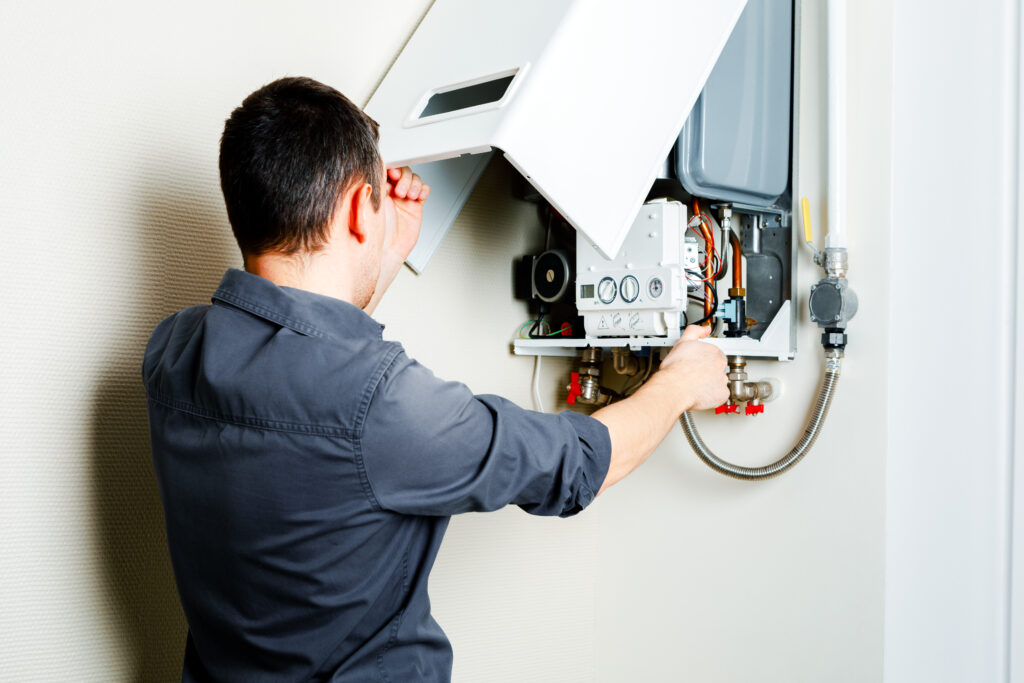Contents
As Scotland’s temperatures drop and winter weather sets in, your boiler becomes central to your home’s comfort. But when was the last time you checked how well it’s actually performing? A boiler not working properly typically shows clear indicators weeks or months before any major issues develop. If your boiler is not working as it should, you’ll likely notice warning signs weeks before complete failure.
At Thermal Care Scotland, our Gas Safe registered engineers regularly service boilers across Scotland and recognise patterns that indicate when a system needs attention. By understanding these five key warning signs now, you can arrange timely maintenance and avoid the inconvenience and expense of winter heating problems.
1. Your Boiler Is Not Working Efficiently: Takes Ages to Heat Up
One of the clearest indicators your boiler needs attention is when it struggles to deliver heat efficiently. If you’re waiting 30+ minutes for radiators to warm up, or they never quite reach your desired temperature, your boiler’s heat exchanger could be affected by limescale build-up or component wear.
This inefficiency means more than slow heating – it means your boiler is working harder to produce minimal results. In Scotland’s hard water areas, particularly around Edinburgh and the Central Belt, limescale accumulation accelerates this issue. The harder your boiler works, the more strain on components, and the higher your energy bills.
What to look for:
- Radiators that are cold at the bottom but warm at the top
- Hot water that runs lukewarm despite maximum settings
- Heating that can’t maintain your set temperature
When your boiler is not working at optimal efficiency becomes apparent through slow heating, it’s consuming more fuel for less output. This directly impacts your energy costs.

2. Strange Noises: Signs Your Boiler Is Not Working Properly
A healthy boiler operates with a consistent, quiet hum. When your boiler starts producing unusual sounds, it’s indicating specific mechanical issues that need addressing.
Banging or knocking (often called ‘kettling’) occurs when limescale or sludge builds up in the heat exchanger, causing water to overheat and steam. This is particularly common in older systems that haven’t had regular maintenance.
Whistling sounds typically indicate trapped air in the system or a loss of pressure – both issues that increase under heavy winter demand.
Gurgling noises suggest air in the system or a frozen condensate pipe – a common occurrence during Scottish winters when temperatures drop below freezing.
These sounds indicate your boiler is not working as it should. Without proper maintenance, these problems can progress to system failure during peak heating season.

3. Rising Energy Bills Despite Normal Usage
Have your energy bills increased even though your heating habits haven’t changed? This often-overlooked indicator suggests your boiler is losing efficiency. A boiler not working at peak performance burns more fuel to maintain the same heat output, driving up your energy costs.
According to Energy Saving Trust, heating and hot water accounts for over half your annual energy bills. In a detached house, a boiler running at less than 70% efficiency can cost in excess of £280 a year more to heat your home compared to an efficient model – funds that could cover professional servicing or contribute towards eventual replacement.
Check for:
- Unexplained increases in gas consumption
- Needing to turn the thermostat higher for the same comfort
- Boiler running constantly to maintain temperature
An inefficient boiler doesn’t just cost more to run; it’s experiencing accelerated wear. This means you’re not just paying more now – you’re also reducing the system’s overall lifespan.
Read out guide Boiler Efficiency Guide: Cutting Energy Bills This Winter in Scotland

4. Boiler Not Working? Check for Pressure Drops or Pilot Light Issues
Your boiler’s pressure gauge should sit steadily between 1 and 1.5 bar when cold. If you’re constantly topping up pressure or your boiler is not working reliably, your system has developed a fault that needs professional attention.
Pressure loss indicates a leak somewhere in your system – either visible (check around radiators and pipes) or within the boiler itself. During Scottish winter, when your heating runs continuously, small leaks quickly become significant problems.
Key indicators include:
- Pressure dropping more than once a month
- Pilot light frequently going out (in older boilers)
- Error codes appearing on your boiler display
- Needing to reset your boiler regularly
For older boilers with pilot lights, repeated outages suggest thermocouple failure or ventilation issues. Both problems require professional diagnosis and repair.
5. Your Boiler is 10-15+ Years Old and Hasn’t Been Serviced
If your boiler was installed before 2014 and hasn’t had recent professional maintenance, it’s operating well beyond its optimal service life. The average boiler lifespan in Scotland’s damp climate is 10-15 years with regular servicing – considerably less without it.
Older boilers weren’t built to modern efficiency standards. Even when functioning, a 15-year-old boiler operates at around 70% efficiency compared to 92%+ for modern A-rated models. That efficiency gap translates directly to higher heating costs.
Consider that older boilers:
- Lack modern safety features and controls
- Have worn components requiring replacement
- Can’t modulate output efficiently
- May not meet current building regulations
If your ageing boiler not working efficiently shows any other indicators from this list, it’s worth reviewing your options.
Read our blog New Boiler Installation Scotland: Complete Cost & Process Guide 2025

What to Do Next: Your Action Plan
If you’ve identified any of these warning signs, here’s your practical next steps:
For immediate concerns (strange noises, pilot light issues, or heating failure):
- Check your pressure gauge – top up if below 1 bar
- Bleed your radiators to release trapped air
- Verify your thermostat is functioning correctly
- Contact a Gas Safe engineer for persistent issues
For preventative maintenance (age-related concerns, efficiency issues):
- Schedule a professional boiler health check
- Plan financially for potential replacement
- Maintain service records for warranty purposes
If your boiler is not working properly after checking these basic steps, it’s time for professional assessment.
Professional servicing is essential: Only Gas Safe registered engineers should work on gas boilers. As MCS Certified and Gas Safe registered engineers, we follow strict safety protocols to ensure your system operates safely and efficiently.
Maintain Your Winter Comfort
Reliable heating is essential for Scottish homes during winter months. When temperatures drop and severe weather arrives, your boiler needs to perform consistently. These five warning signs help you identify when your system needs professional attention.
Regular servicing by qualified engineers can extend your boiler’s operational life and prevent most winter heating issues. Our annual boiler service includes a comprehensive 18-point safety check, efficiency assessment, and preventative maintenance that ensures optimal performance throughout winter.
Taking action when you notice warning signs prevents inconvenient breakdowns and reduces repair costs. If your boiler not working reliably is causing concern, contact our team for professional assessment and advice specific to your system.
Ready to ensure reliable heating this winter? Book your boiler health check today and maintain consistent comfort through the coldest months.res drop and severe weather arrives, your boiler needs to perform consistently. These five warning signs help you identify when your system needs professional attention.

